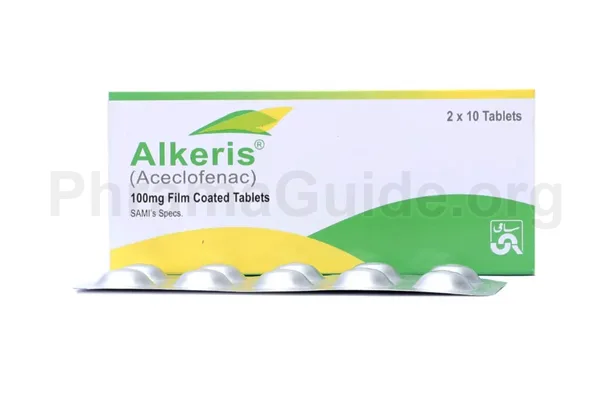Alkeris tablet belongs to a nonsteroidal anti-inflammatory drug (NSAID) and is used to treat mild to moderate pain and inflammatory conditions, such as:
- Osteoarthritis: Alkeris tablet is often used to relieve pain, reduce inflammation, and improve joint function in individuals with osteoarthritis, a degenerative joint disease that causes joint pain and stiffness.
- Rheumatoid Arthritis: Alkeris tablets may be used to manage the symptoms of rheumatoid arthritis, an autoimmune disease characterized by joint inflammation and pain.
- Ankylosing Spondylitis: Alkeris tablets can be used to alleviate pain and stiffness associated with ankylosing spondylitis, a type of chronic inflammatory arthritis that primarily affects the spine.
- Acute Musculoskeletal Disorders: Alkeris tablets may also be used for the short-term management of acute musculoskeletal disorders, such as sprains, strains, and traumatic injuries, to reduce pain and inflammation.
Off-label Uses of Alkeris Tablet
- Postoperative Pain: Alkeris tablets may be used off-label for the management of postoperative pain, particularly in cases where other analgesics are not suitable or effective. It can help reduce pain and inflammation following surgical procedures.
- Menstrual Pain (dysmenorrhea): Some healthcare providers may prescribe Alkeris tablets off-label to alleviate the pain and discomfort associated with menstrual cramps (dysmenorrhea).
- Migraine Headache: In some cases, Alkeris tablets may be used off-label for the treatment of acute migraine attacks. It may help reduce inflammation and relieve associated symptoms.
- Gout: Alkeris tablets may be used off-label for the management of pain and inflammation associated with gout, a type of arthritis caused by the buildup of uric acid crystals in joints.
- Dental Pain: Alkeris tablets may be used off-label to manage dental pain, such as toothaches or post-dental procedure pain.

What is Alkeris?
Alkeris is one of the leading brands of Aceclofenac, manufactured and marketed by Sami Pharmaceuticals (Pvt) Ltd, Pakistan.
Alkeris Alternatives : Other Similar Brands
The following are some alternative brands of Alkeris and their manufacturers.
- Acemed : Novartis, Pakistan
- Airtal : Highnoon Laboratories (Pvt) Ltd, Pakistan.
- Dyclo-Ace : Indus Pharma (Pvt) Ltd.
- Acelish : Platinum Pharmaceuticals (Pvt.) Ltd.
- Spiano : Continental Pharmaceuticals Ltd.
- Acecol : Maple Pharmaceuticals (Pvt) Ltd.
- Actavis : Genix Pharma (Pvt) Ltd.
- Acenac : S.J. & G. Fazul Ellahie (Pvt) Ltd.
- Pefree : Efroze Chemical Industries (Pvt) Ltd.
- Ophen : Standpharm Pakistan (Pvt) Ltd.
Alkeris : Available Formulations and Strengths
Presently, Alkeris is available in Tablet and Topical Get Forms with the following strengths.
Alkeris Tablet : 100mg strength.
Alkeris SR Tablet : 200mg strength.
Alkeris Gel : 1.5%w/w.
Who Should Not Use Alkeris?
Alkeris has some contraindications, which are situations or conditions in which the use of Alkeris is not recommended due to the potential risks outweighing the benefits.
Hypersensitivity: Alkeris should not be used in individuals who have a known hypersensitivity or allergy to the medication or any other NSAIDs (nonsteroidal anti-inflammatory drugs). Allergic reactions can range from mild skin reactions to severe anaphylaxis, a life-threatening allergic response.
Asthma, rhinitis, and nasal polyps: Alkeris is contraindicated in individuals with a history of asthma, allergic rhinitis, or nasal polyps. It can trigger or exacerbate asthma attacks or other allergic reactions.
Active peptic ulcer or gastrointestinal bleeding: Alkeris is contraindicated in individuals with active peptic ulcers or a history of gastrointestinal bleeding. It can further irritate the stomach lining and increase the risk of bleeding.
Severe liver impairment: Alkeris is contraindicated in individuals with severe liver impairment, as the medication is metabolized in the liver. Impaired liver function can lead to increased drug levels and potential toxicity.
Severe renal impairment: Alkeris is contraindicated in individuals with severe renal impairment, as it can further compromise kidney function and lead to potential complications.
The third trimester of pregnancy: Alkeris is contraindicated during the third trimester of pregnancy as it may increase the risk of fetal complications and prolong labor.
History of gastrointestinal bleeding or perforation: Alkeris should be used with caution or avoided in individuals with a history of gastrointestinal bleeding or perforation, as it can increase the risk of recurrent bleeding or perforation.
What is the Recommended Daily Dosage of Alkeris?
Alkeris Dose for Osteoarthritis and Rheumatoid Arthritis:
- One Tablet of 100mg, once daily, preferably with food.
- The maximum recommended daily dose is 200 mg.
Alkeris Dose for Ankylosing Spondylitis:
- One Tablet of 100mg, once daily, preferably with food.
- The maximum recommended daily dose is 200 mg.
How Alkeris Works?
Alkeris works by inhibiting the activity of cyclooxygenase enzymes, specifically the COX-2 isoform, to a greater extent than the COX-1 isoform. These enzymes play a crucial role in the synthesis of prostaglandins, which are chemical messengers involved in the inflammatory process. By inhibiting COX-2, Alkeris reduces the production of prostaglandins, thereby decreasing inflammation, pain, and swelling.

Leave A Comment